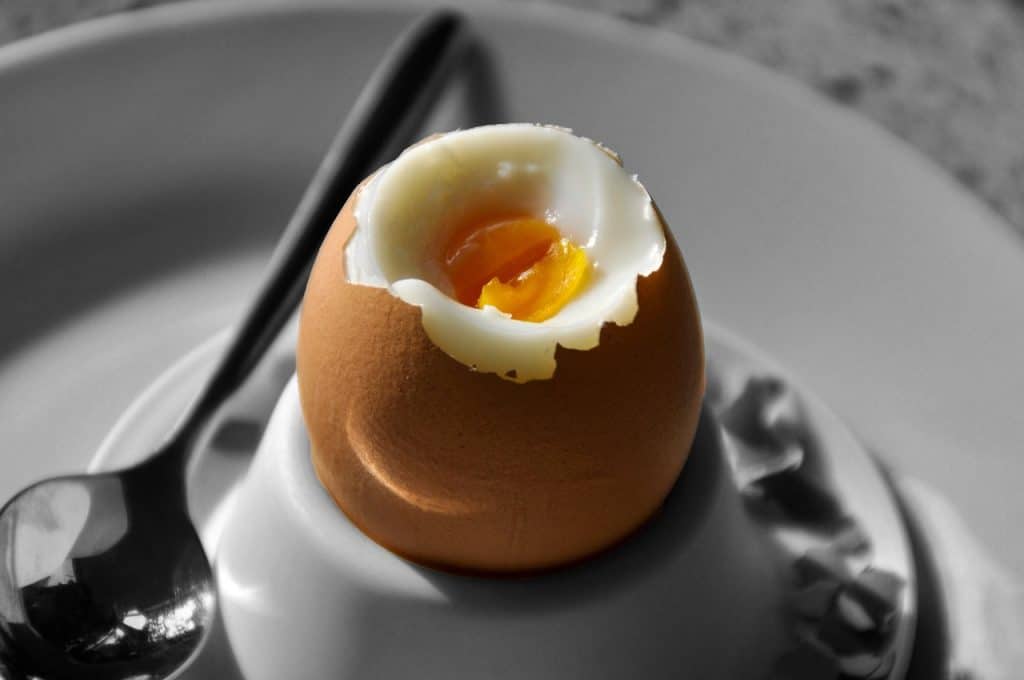- How to Make Ramen in the Microwave - December 29, 2025
- Slow Cooker Potatoes Recipe - December 29, 2025
- How to Cook Sweet Potatoes in Microwave - December 29, 2025
Want to turn eggs from plain to exciting? Eggs impress at any meal when cooked right, not just breakfast. Picture a soft omelet that feels like a cloud or fries so crispy they snap with flavor. How eggs cook changes their protein, making them easier or tougher to digest. Here’s a neat trick: toss in a pinch of baking soda to scrambled eggs to make them fluffy, like tiny pillows on your plate. This tip rocks for anyone craving quick, tasty food with a cool twist. Explore how simple hacks transform eggs into unforgettable dishes and why nailing egg cooking boosts kitchen skills big time. Keep reading—these secrets will make meals pop and cravings soar.
A boiled egg is an egg that has been cooked in hot water.
There are many different ways to cook eggs, but boiling is a popular method because it is quick and straightforward.
Boiled eggs can be eaten on their own or used in recipes such as deviled eggs or egg salad.
Soft-boiled eggs are a delicious and healthy breakfast option, but they can be difficult to make correctly without ruining them.
That’s where the microwave comes in – with this simple guide; you’ll be able to make perfect soft-boiled eggs every time.
When you want a soft-boiled egg but don’t want to wait for the water to boil, reach for the microwave.
This simple method delivers perfectly cooked eggs with runny yolks and firm whites in just a few minutes.

How do you make soft-boiled eggs in the microwave?
This recipe is for one egg, but you can easily adjust it for more eggs.
Follow these simple steps to make soft boiled eggs in the microwave:
Things you’ll need:
●1 egg
●1/2 cup water
●A microwave-safe bowl or mug
●A fork
Instructions:
1.Start by pricking the large end of the egg with a sharp knife or thumbtack.
This will prevent the egg from bursting in the microwave.
2.Place the egg on a microwave-safe plate and cook it on high power for 45 seconds.
If your egg is extra-large, you may need to cook it for 60 seconds.
3.Let the egg cool for a minute or two before peeling it.
The shell should come off easily once the egg has cooled down.
4.Enjoy your soft-boiled egg with a sprinkle of salt and pepper!
Additional information:
1.If you want a firmer yolk, cook the egg for an additional 15-30 seconds.
2.For a harder-boiled egg, cook the egg for 2-3 minutes on high power.
3.You can also make poached eggs in the microwave using this method.
Simply add 1/4 cup of water to the mug or bowl and cook the egg for 2-3 minutes.
4.With this simple guide, you can make perfect soft-boiled eggs in the microwave.
All you need is an egg, some water, and a microwave-safe bowl or mug.
Follow the instructions above and enjoy your soft-boiled egg with a sprinkle of salt and pepper!
How do you want your eggs?
For soft-boiled eggs with runny yolks, microwave for 45 seconds to 1 minute on 50% power.
For firm yolks, microwave for 1 to 1 1/2 minutes on 50% power.
For both soft-boiled and firm yolks, begin by piercing the large end of the egg with a sharp knife.
This will prevent the egg from exploding in the microwave.
Place the egg on a microwavable plate and cook on 50% power for the desired time.
Remove from the microwave and run under cold water to cool.
Serve with salt, pepper, and your favorite dipping sauce.
How do you store boiled eggs?
It’s so sad when you boil eggs, and they turn out bad.
But how do you store them, so they aren’t bad in the first place?
There are a few different ways to do it.
1.The first way is to put them in a container and store them in the fridge.
The problem with this is that the eggs can get cold and rubbery.
2.The second way is to store them in an airtight container in the fridge.
This will keep them from getting cold, but they might spoil faster this way.
3.The third way is to store them in a container of water in the fridge.
This will keep them from getting cold or rubbery, but they might spoil faster this way.
4.The fourth way is to store them in the freezer.
This will keep them from getting cold or rubbery, but they might spoil faster this way.
The best way to store boiled eggs is in the fridge in an airtight container.
This will keep them from getting cold or rubbery, and they will last longer this way.
Health Benefits of Eating Boiled Eggs
We all consider eggs as a staple in our diet, but do we really know all their health benefits?
Eggs are one of the richest sources of protein and contain all the essential amino acids required by our body.
Here are some more incredible health benefits of eating boiled eggs:
1. Boosts Brain Function
Eggs are a great source of choline, a nutrient that plays an essential role in brain development and memory function.
Choline is also known to help reduce inflammation in the brain, which has been linked to Alzheimer’s disease and another age-related cognitive decline.
2. Lowers Risk of Heart Disease
Eggs are a good source of omega-3 fatty acids, which are known to help lower the risk of heart disease.
Omega-3 fatty acids help to reduce harmful cholesterol levels and inflammation in the body, both of which are significant contributors to heart disease.
3. Aids Weight Loss
Eggs are a low-calorie food and contain high-quality protein, making them an excellent choice for people trying to lose weight.
Protein helps to boost metabolism and burn calories, making it a key ingredient in any weight loss plan.
4. Improves Eye Health
Eggs are a good source of lutein and zeaxanthin, two antioxidants that help protect the eyes from age-related damage.
These antioxidants help to reduce the risk of cataracts and macular degeneration, two common eye diseases.
5. Promotes Healthy Hair and Skin
Eggs are a good source of biotin, a nutrient that is essential for healthy hair and skin.
Biotin helps to keep hair shiny and scalp healthy, and it also helps to prevent dry, flaky skin.
6. Builds Strong Bones
Eggs are a good source of vitamin D, a nutrient that is essential for bone health.
Vitamin D helps the body to absorb calcium, which is necessary for strong and healthy bones.
7. Boosts Immune System
Eggs are a good source of selenium, a mineral that plays an essential role in the immune system.
Selenium helps to protect the body from infection and disease by stimulating the production of white blood cells.
8. Regulates Blood Sugar Levels
Eggs are a low-glycemic food, meaning that they do not cause a spike in blood sugar levels.
This makes them a good choice for people with diabetes or prediabetes, as they help to regulate blood sugar levels over time.
9. Rich in Nutrients
Eggs are a rich source of nutrients, including protein, omega-3 fatty acids, choline, vitamin D, and selenium.
This makes them an excellent choice for people who are looking for a nutritious, protein-rich snack.
As you can see, eggs are a nutrient-rich food with a variety of health benefits.
So next time you’re at the grocery store, be sure to pick up a dozen eggs!
Nutritional Facts of Boiled Eggs
A boiled egg is an excellent source of protein and other nutrients.
According to the USDA, a large boiled egg contains six grams of protein, five grams of fat, 185 milligrams of cholesterol, and 70 calories.
It also contains significant amounts of vitamins A, B-6, and B-12, as well as selenium, phosphorus, and iodine.
Nutritional Fact:
●Calories: 70
●Fat: 5 g
●Cholesterol: 185 mg
●Protein: 6 g
●Sodium: 70 mg
●Potassium: 140 mg
●Carbohydrates: 0 g
●Fiber: 0 g
●Sugar: 0 g
●Vitamin A: 10%
●Vitamin C: 0%
●Calcium: 0%
●Iron: 4%
While boiled eggs are a healthy food, they are also high in cholesterol.
If you have high cholesterol, you should limit your intake of boiled eggs and other foods high in cholesterol.
Frequently Asked Questions
Why Should You Never microwave a hard-boiled egg?
People often ask if it’s safe to microwave a hard-boiled egg.
The answer is no, for two reasons.
You should never microwave a hard-boiled egg because it can cause the egg to explode.
When eggs are heated in the microwave, the heat causes the air inside the egg to expand.
This can cause the egg to burst and release hot liquid and steam, which can burn you.
Additionally, microwaving hard-boiled eggs can make them tough and rubbery.
If you want to reheat hard-boiled eggs, it’s best to do so in the oven or on the stove.
How long do you boil 6 eggs in the microwave?
To boil six eggs in the microwave, you will need to set the timer for between three and a half minutes to four minutes.
The cook time will depend on the wattage of your microwave and how well done you like your eggs.
We suggest checking on the eggs after three minutes and thirty seconds to see if they are cooked to your liking.
If they need more time, continue cooking in 30-second increments until they are done.
Once the eggs are cooked, carefully remove them from the microwave using a spoon or tongs and place them in a bowl of cold water to stop the cooking process.
Let them sit in the water for a few minutes before peeling and eating.
Can you microwave eggs in the shell?
Yes, you can microwave eggs in their shells, but it’s not recommended.
Microwaving eggs in shells can cause them to explode and make a mess.
If you do decide to microwave eggs in their shells, be sure to prick the eggshells with a fork before cooking to allow steam to escape.
Cook the eggs in a low-power setting and keep an eye on them to make sure they don’t explode.
When in doubt, it’s better to err on the side of caution and cook eggs in a different way.
Why does salt prevent eggs from exploding in the microwave?
Adding salt to water creates a hypertonic solution, which means that the water molecules are more attracted to each other than they are to the egg.
This increased attraction prevents the water molecules from penetrating the egg’s membrane, and as a result, the egg doesn’t explode.
Additionally, the salt helps to cook the egg more evenly.

Soft Boiled Egg in the Microwave
Ingredients
- 1 egg
- 1/2 cup water
Instructions
- Start by pricking the large end of the egg with a sharp knife or thumbtack.
- This will prevent the egg from bursting in the microwave.
- Place the egg on a microwave-safe plate and cook it on high power for 45 seconds.
- If your egg is extra-large, you may need to cook it for 60 seconds.
- Let the egg cool for a minute or two before peeling it.
- The shell should come off easily once the egg has cooled down.
- Enjoy your soft-boiled egg with a sprinkle of salt and pepper!



